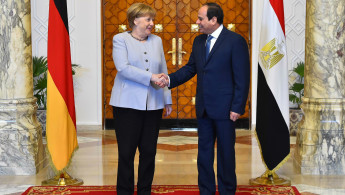Merkel ignores Sisi's human rights record for immigration-curbing deal
The German Chancellor on Thursday pledged to boost support for Egypt's economic development and partner with Cairo to help address the region's refugee crisis.
After meeting with Sisi, Merkel told reporters she had discussed providing assistance and equipment to stop human traffickers from using Egypt as a transit country. Neither leaders provided further details.
"There are a variety of refugees in Egypt, and we would like these refugees to have better opportunities - as Egypt faces a big challenge, we are discussing concrete points," she said at a joint news conference in the presidential palace.
"We can imagine further support but have not reached this point yet."
Germany wants to help Egypt strengthen its coast guard and crack down on illegal trafficking across the Mediterranean, where thousands of migrants die at sea each year.
 |
[These] dodgy deals...could trap asylum seekers and migrants from elsewhere in countries like Tunisia and Egypt that cannot guarantee decent treatment -HRW |
 |
"Egypt has made proposals for technical support that also must be further discussed, but I think that when it has to do with border security, Germany is very ready to deliver support," Merkel said.
The visit was her first to the country in a decade.
Merkel, who faces elections in September, has been under intense pressure to reduce the number of asylum seekers coming to Germany, which has taken in over one million migrants since 2015.
'Dodgy deals'
Human Rights Watch noted that Egypt banned protests and jailed thousands of people, while outlawing the Muslim Brotherhood movement president Mohamed Morsi whom Sisi, a former army chief, overthrew in 2013.
HRW's Judith Sunderland criticised Merkel, who will fly to Tunisia on Friday for similar reasons, for pursuing "dodgy deals that could trap asylum seekers and migrants from elsewhere in countries like Tunisia and Egypt that cannot guarantee decent treatment or meaningful access to asylum."
At the press conference with Sisi, Merkel said very little about Egypt's human rights record, except to raise the topic of Egypt's controversial NGO law aimed at stifling civil society.
 |
Merkel has been under intense pressure to reduce the number of asylum seekers coming to Germany |  |
Merkel is joined by a business delegation that could sweeten the diplomacy with investments badly needed by both countries, which are grappling with sluggish economies, militant attacks and high unemployment, especially among youths.
She had also planned a trip to Algeria last week, but it was called off after President Abdelaziz Bouteflika fell ill.
Turmoil exploited by people smugglers since the 2011 overthrow of Moamer Kadhafi has made Libya, which neighbours Egypt and Tunisia, the main gateway for African migrants seeking to make dangerous Mediterranean crossings.
"Without a political stabilisation of Libya, we won't be able to stop the human traffickers operating out of Libya who are responsible for by far the most arrivals in Italy," Merkel said in her latest weekly podcast.
Germany, which this year holds the G20 presidency, has also announced investment partnerships in Africa with the long-term goals of reducing poverty and deterring people from leaving in the first place.
Last year, Berlin spearheaded an EU agreement with Ankara that helped sharply reduce the influx of migrants through Turkey and western Balkan countries.
Agencies contributed to this report.





 Follow the Middle East's top stories in English at The New Arab on Google News
Follow the Middle East's top stories in English at The New Arab on Google News
![The UAE is widely suspected of arming the RSF militia [Getty]](/sites/default/files/styles/image_330x185/public/2024-11/GettyImages-472529908.jpg?h=69f2b9d0&itok=Yauw3YTG)
![Netanyahu furiously denounced the ICC [Getty]](/sites/default/files/styles/image_330x185/public/2024-11/GettyImages-2169352575.jpg?h=199d8c1f&itok=-vRiruf5)
![Both Hamas and the Palestinian Authority welcomed the ICC arrest warrants [Getty]](/sites/default/files/styles/image_330x185/public/2024-11/GettyImages-2178351173.jpg?h=199d8c1f&itok=TV858iVg)